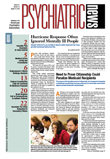APA hopes it can convince the federal government to modify a new rule requiring Medicaid beneficiaries to prove citizenship and identity before beneficiaries with mental illness start confronting loss of coverage.
The policy, mandated by the Deficit Reduction Act (DRA) enacted in February, was scheduled to be implemented by the Centers for Medicare and Medicaid Services (CMS) in early July. However, CMS continued to develop implementation plans after the intended start date. The final regulations were expected to be released in mid-August.
Documents that can be used to prove citizenship include a U.S. passport, certificate of U.S. naturalization, and certificate of U.S. citizenship. Other documents—such as a U.S. birth certificate or official military record of service showing a U.S. place of birth—are acceptable when accompanied by proof of identity.
In the past, most states allowed beneficiaries to attest to U.S. citizenship under penalty of perjury. Documentation was required only from those whose citizenship status was in doubt
Congress enacted the new requirement over concerns that illegal immigrants were falsely claiming citizenship to receive Medicaid benefits, although the Office of Inspector General at the Department of Health and Human Services found no substantial evidence of such problems.
APA applauded the decision by CMS in early July to allow states to exempt the approximately 8 million people already enrolled in Supplemental Security income or Medicare programs. Most states have opted to take that less-restrictive route.
Critics of the citizenship policy, including APA, said that it endangers the health care of about 40 million recipients not included in the exemption.
“Requiring paperwork for people who are seriously and persistently mentally ill is not very realistic,” said Lizbet Boroughs, deputy director of APA's Department of Government Relations. “Someone who has been in and out of homeless shelters for years probably does not have a driver's license, has long since lost his Social Security card, and I'm sure is not walking around with a copy of his high school diploma.”
Among the categories of beneficiaries with which mental health advocates are most concerned are foster children, who are generally eligible for Medicaid and have high rates of both medical and mental health problems but have difficulty documenting citizenship. Others at risk of losing their benefits are applicants who are found eligible for the Social Security Disability Income or Medicare programs, but who are still in the waiting period for those programs.
The regulations require states to help applicants with an “incapacity of mind or body” to locate citizenship documents when applicants cannot comply quickly and lack a representative to assist them. Such individuals include those who have amnesia, mental illness, or physical incapacity.
According to CMS, states also can document citizenship and identity through data matches with state-government agencies, such as with school records, to establish the identity of children. If documentation is unavailable, CMS may accept signed affidavits from two citizens—one of whom cannot be related to the applicant—who “have specific knowledge” of a beneficiary's citizenship status.
The agency noted that current beneficiaries should not lose benefits while making “a good-faith effort to provide documentation to the state.”
APA has urged modifications of the rule through its partnership with the Campaign for Mental Health Reform. In a letter in May to CMS, the campaign urged the agency to allow “a broad list of other documents that may be used to demonstrate citizenship, particularly those accepted by other federal agencies, including the Social Security Administration and the Department of Justice.”
William Emmet, interim director of the campaign, said CMS's decision to give states some discretion in determining which applicants meet the proof-of-citizenship standard was a positive step and that he hoped for similar latitude in the agency's final rules.
“Our concern all along was that people with mental illnesses and other disabilities—people who are aged and infirmed with mental illness, for example—are the most at risk, but the feds have left the door open for the states to provide the kinds of assistance that those folks may need,” Emmet told Psychiatric News.
“It is critically important that remedial action occurs quickly... so that Medicaid beneficiaries don't lose their health lifeline.”
APA also is coordinating with the bipartisan National Governors Asssociation, which is engaging in talks with federal officials responsible for implementing the law.
Opponents of the documentation requirements have filed a class-action lawsuit challenging the change from previous requirements.
“It is critically important that remedial action occurs quickly, either by the Congress repealing the law or the federal district court enjoining it, so that Medicaid beneficiaries don't lose their health lifeline,” said Ron Pollack, executive director of Families USA, which is assisting with the lawsuit.
Opponents of the requirement estimate that approximately 3 million to 5 million low-income people may lose their Medicaid benefits because they are unable to produce the required documents. Hospitals are still required to provide emergency care regardless of whether individuals meet the documentation requirement.
The CMS letter is posted at<www.familiesusa.org/assets/pdfs/Fact-Sheet-Citizenship.pdf>. The proof-of-citizenship requirements are posted at<www.cms.hhs.gov/MedicaidEligibility/05_ProofofCitizenship.asp#TopOfPage>.▪
